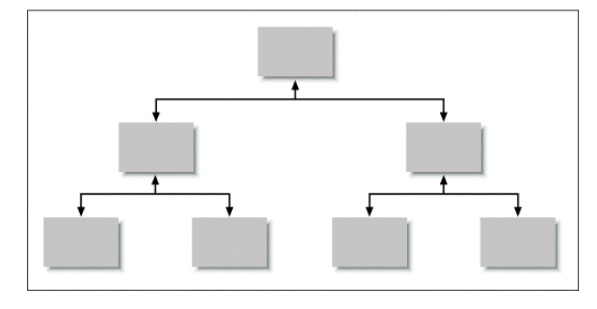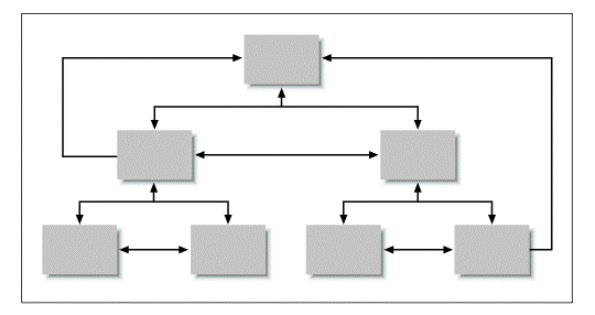Chapter: Information Architecture on the World Wide Web : Designing Navigation Systems
Improving Flexibility
Improving Flexibility
As discussed in the previous chapter,
hierarchy is a familiar and powerful way of organizing information. In many
cases, it makes sense for a hierarchy to form the foundation for organizing
content in a web site. However, hierarchies can be fairly limiting from a
navigation perspective. If you have ever used the ancient information browsing
technology and precursor to the World Wide Web known as Gopher, you will
understand the limitations of hierarchical navigation. In Gopherspace, you were
forced to move up and down the tree structures of content hierarchies (see Figure 4.3). It was not practical to encourage or
even allow jumps across branches (lateral navigation) or between multiple
levels (vertical navigation) of a hierarchy.
Figure 4.3. On a Gopher site, you could only move up or
down through the tree structure of the hierarchy.

The Web's hypertextual capabilities removed
these limitations, allowing tremendous freedom of navigation. Hypertext
supports both lateral and vertical navigation (see Figure
4.4). From any branch of the hierarchy, it is possible and often
desirable to allow users to laterally move into other branches. For example, as
you explore the Programs and Events section of a conference web site, you may
decide to register for that conference. A hypertext link should allow you to
jump to Registration without first retracing your steps back up the Programs
and Events hierarchy.
Figure 4.4. In a hypertext system, navigation links can
completely bypass the hierarchy. You can enable users to get anywhere from
anywhere. However, as you can see from this diagram, things can get confusing
pretty quickly. It begins to look like an architecture from M.C. Escher.

It is also possible and often desirable to
allow users to move vertically from one level in a branch to a higher level in
that same branch (e.g., from a specific Program back to the main Programs and
Events page) or all the way back to the main page of the web site.
The trick with designing navigation systems is
to balance the advantages of flexibility with the dangers of clutter. In a
large, complex web site, the complete lack of lateral and vertical navigation
aids can be very limiting. On the other hand, too many navigation aids can bury
the hierarchy and overwhelm the user.
Navigation systems should be designed with
care to complement and reinforce the hierarchy by providing added context and
flexibility.
Related Topics